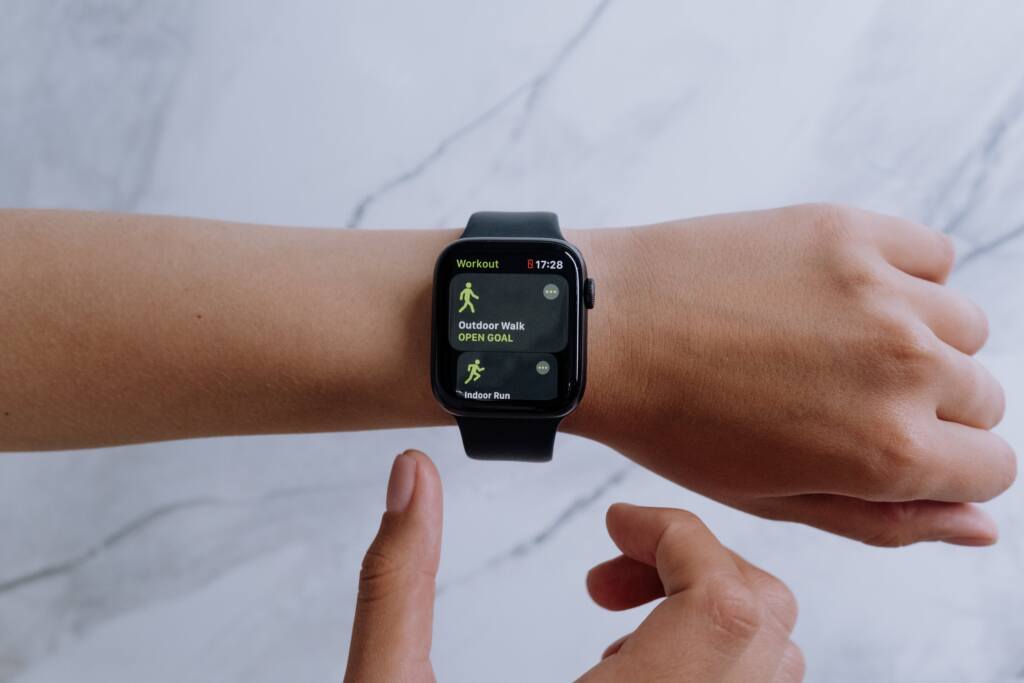5 Transformative Digital Health Trends

Digital health has changed healthcare. It brings new opportunities, advancements, and innovations that can improve patient care. Telemedicine, artificial intelligence, wearable technology, big data analytics, and virtual reality are changing healthcare. This article explores five trends that are transforming patient care.
Key Takeaways:
Digital health is bringing new opportunities and advancements to the healthcare industry.
Telemedicine, artificial intelligence, wearable technology, big data analytics, and virtual reality are changing patient healthcare.
These trends have the potential to improve patient outcomes and revolutionize healthcare delivery.
What is Digital Health?
Digital health uses digital technologies to improve health and healthcare delivery. These technologies include software, sensors, and mobile devices. It encompasses various aspects of healthcare, including diagnosis, treatment, and patient monitoring. Digital health has the power to make healthcare more accessible, personalized, and efficient.
A formal definition of Digital Health:
Digital health is the combination of digital technologies and healthcare. It improves the efficiency and quality of healthcare delivery. It includes electronic health records, telemedicine, wearable devices, mobile health apps, and health analytics.
The Importance of Digital Health in Patient Healthcare
Digital health plays a crucial role in improving patient healthcare in several ways. Telemedicine improves access to healthcare services, especially in remote areas with limited healthcare infrastructure. Patients can consult healthcare professionals from home, saving time and effort. Secondly, digital health promotes patient engagement in their own healthcare.
With the help of mobile health apps and wearable devices, patients can actively monitor their health and track vital signs, leading to better self-management of chronic conditions. Digital health helps healthcare providers analyze patient data. This analysis gives valuable insights to improve treatment outcomes. Big data analytics and artificial intelligence make diagnoses more accurate and treatment plans more personalized.
https://7thavewellnessblog.com/?p=3799
Digital Health Trends
1. Telemedicine
Telemedicine is the practice of delivering healthcare services remotely using telecommunications technology. Patients can consult with healthcare professionals through video conferences, phone calls, or online messaging.
Definition of Telemedicine
Telemedicine refers to the remote delivery of healthcare services using telecommunications technology. It enables patients to consult with healthcare professionals without physical contact, providing convenience and accessibility.
Benefits of Telemedicine
Telemedicine makes healthcare more accessible. It helps patients who live far away or have trouble moving to get medical advice and treatment. Telemedicine is convenient and saves time. Patients can consult healthcare professionals from home, avoiding long travel times and waiting rooms. Telemedicine is cost-effective. It reduces healthcare costs by minimizing the need for in-person visits and hospitalizations.
Challenges of Telemedicine
Telemedicine has limitations for physical examinations. Healthcare professionals cannot physically assess patients.
Technical difficulties
A reliable internet connection and sufficient technological infrastructure are required for successful telemedicine consultations.
Privacy and security concerns
Protecting patient privacy and ensuring the security of medical information transmitted electronically are important challenges to address.
Future of Telemedicine
Telemedicine will keep growing because of technological advancements and the increasing need for accessible healthcare. Artificial intelligence and remote monitoring devices will enhance telemedicine, making diagnosis and treatment planning more accurate.
https://www.ncbi.nlm.nih.gov/
2. Artificial Intelligence in Healthcare
Artificial intelligence (AI) is revolutionizing the healthcare industry by enabling machines to perform tasks that traditionally require human intelligence. In healthcare, AI is being employed to improve diagnostics, treatment planning, and patient monitoring.
How AI is Revolutionizing Healthcare
AI algorithms can analyze large amounts of patient data. AI can identify patterns and make accurate diagnoses. This reduces the chance of misdiagnosis or delayed treatment, improving patient outcomes. AI also helps healthcare professionals develop personalized treatment plans. It considers factors like medical history, genetics, and lifestyle.
Applications of AI in Healthcare
AI algorithms can analyze medical images like X-rays or MRI scans. They can detect abnormalities and help with diagnosis. AI can analyze patient data and predict the chances of developing certain conditions or complications. AI-powered virtual assistants can give patients personalized healthcare advice and reminders. AI is used in robotic surgical systems to help surgeons perform complex procedures accurately.
3. Wearable Technology

Wearable technology is popular. People use devices like smartwatches, fitness trackers, and health monitoring devices. These devices help people track their fitness goals, monitor vital signs, and find potential health issues.
Advancements in Wearable Technology
Wearable devices are now more advanced. They offer many features, like heart rate monitoring, sleep tracking, and calorie counting. These devices are also becoming more seamless and stylish, integrating into everyday life.
Benefits of Wearable Technology in Healthcare
You can monitor your vital signs, activity levels, and sleep patterns to better understand your health and well-being. Wearable devices can detect health issues early. They can alert individuals to potential problems like abnormal heart rates or sleep disturbances. This helps with timely intervention. Wearable devices also improve patient engagement. They encourage individuals to actively monitor and improve their health.
4. The Role of Big Data and Analytics
Big data is a lot of information from various sources, like electronic health records, medical devices, and patient surveys. Healthcare providers can use big data and advanced analytics to gain valuable insights and make data-driven decisions.
How Big Data is Shaping Healthcare
Big data analytics enables healthcare providers to analyze large datasets and identify trends, patterns, and correlations that can be used to improve patient care. It allows for more accurate predictions, personalized treatment plans, and better resource allocation.
Applications of Big Data in Healthcare
Predictive analytics: By analyzing large datasets, healthcare providers can predict disease outbreaks, identify high-risk individuals, and develop preventive strategies.
Precision medicine: Big data analytics helps develop personalized treatment plans based on an individual’s genetic makeup, lifestyle, and other relevant factors.
Quality improvement: Analyzing healthcare data helps identify areas for improvement, such as reducing hospital readmissions or optimizing resource allocation.
5. Virtual Reality in Healthcare
Virtual reality (VR) is a technology that simulates an immersive, computer-generated environment, replicating real or imagined scenarios. In healthcare, VR is utilized for pain management, surgical training, and mental health therapy.
How Virtual Reality is Transforming Healthcare
Virtual reality can distract patients from pain, anxiety, or discomfort during medical procedures. It is used in surgical simulations to train surgeons without risks to patients. Virtual reality is also being explored as a tool for mental health therapy to help patients confront and manage their fears or phobias.
Applications of Virtual Reality in Healthcare
Pain management: VR is being used as a distraction technique during painful medical procedures, reducing the need for medications and improving patient comfort.
Surgical training: Virtual reality enables surgical trainees to practice procedures in a realistic environment, enhancing their skills and reducing risks during actual surgeries.
Mental health therapy: VR therapy provides a safe and controlled environment for patients to confront and manage anxiety disorders, phobias, and post-traumatic stress disorder.
How Digital Health is Improving Patient Outcomes
Digital health trends can improve patient outcomes. They make healthcare more accessible and help detect health issues early. They also create personalized treatment plans and improve patient engagement. Telemedicine enables patients to quickly receive medical advice, reducing delays in diagnosis and treatment. Wearable technology lets individuals actively monitor their health and detect potential issues before they become serious. Healthcare professionals use artificial intelligence and big data analytics to gain valuable insights for making accurate diagnoses and developing personalized treatment plans.
Challenges and Limitations of Digital Health
While digital health brings numerous advantages, it also comes with challenges and limitations. Privacy and security concerns are significant issues when it comes to the exchange and storage of sensitive patient information. Additionally, the accessibility and affordability of digital health technologies can be limited, particularly in underserved areas or low-income populations. Furthermore, the reliance on technology can create a digital divide, rendering some individuals unable to access or benefit from digital health solutions.
The Future of Digital Health
Digital health has a promising future. Advancements and innovations will transform patient healthcare. Healthcare can become more personalized and precise by incorporating these trends. This will result in better patient outcomes and improved healthcare delivery. Policymakers, regulatory bodies, and healthcare providers need to adjust to these changes. They must ensure responsible and ethical use of digital health technologies.
Conclusion
Digital health trends are changing patient healthcare. These trends include telemedicine, artificial intelligence, wearable technology, big data analytics, and virtual reality. They offer new opportunities and advancements. These trends can improve patient outcomes, make healthcare services more accessible, and change how healthcare is delivered. As the healthcare industry evolves, embracing digital health and using its transformative powers to provide better, more efficient, and patient-centered care is important.
FAQ’s
Q: How is digital transformation impacting the healthcare system?
A: Digital transformation is fundamentally reshaping the healthcare system by introducing digital tools, streamlining workflows, improving care delivery, and enhancing health outcomes through data-driven insights and personalized care models.
Q: What are some key challenges and opportunities in digital healthcare?
A: Some key challenges in digital healthcare include data breaches, adapting to emerging technologies, and ensuring health equity. However, digital healthcare also presents opportunities for improved patient experience, enhanced care delivery, and innovative technology solutions.
Q: How has the pandemic accelerated the adoption of digital health solutions?
A: The pandemic has accelerated the adoption of digital health solutions by driving the increased use of telehealth, remote patient monitoring, and virtual care platforms to ensure continuity of care and minimize in-person interactions.
Q: What role do wearables play in digital health?
A: Wearables have become integral to digital health, enabling real-time monitoring of health data, empowering patients to track their wellness, and providing actionable insights for healthcare professionals to personalize care and interventions.
Q: How are electronic health records (EHR) transforming healthcare data management?
A: Electronic health records (EHR) are transforming healthcare data management by centralizing patient information, improving data accessibility, supporting data-driven decision-making, and enhancing the coordination of care across the healthcare ecosystem.
Q: In what ways is digital innovation benefiting health professionals in the healthcare industry?
A: Digital innovation is benefiting health professionals in the healthcare industry by enabling the use of advanced technologies such as machine learning, supporting streamlined workflows, and enhancing the delivery of care through data-driven insights and tailored interventions.
Q: How is digital technology enhancing the patient experience in primary care?
A: Digital technology is enhancing the patient experience in primary care by facilitating virtual consultations, empowering patients with access to health information, and promoting proactive engagement in managing their health and wellness.
Q: What are the implications of data breaches in the context of healthcare data security?
A: Data breaches in healthcare pose significant implications for data security, potentially compromising patient privacy, disrupting care delivery, and underscoring the critical need for robust data protection measures and risk mitigation strategies across the healthcare ecosystem.







